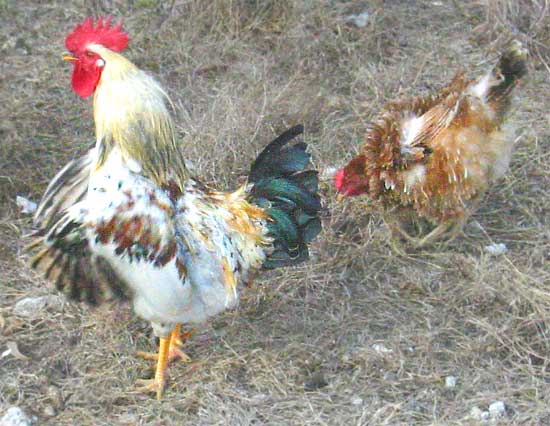
An Excerpt from Jim Conrad's
NATURALIST NEWSLETTER
April
14, 2008
Written
in the community of 28 de Junio and issued from a ciber 8 kms to the west in Pujiltic, Chiapas, MÉXICO
Most people here keep chickens, some behind fences but mostly just running loose. When I first arrived I began noticing a certain rooster and hen couple who always stayed together, apart from the others. The rooster was very handsome but so cowardly that when he found something to eat he'd cluck the way he's supposed to in order to call the hen, but when the hen would run toward him, instead of mounting her like a decent rooster, he'd get visibly agitated and run away. Toss him corn and he'd run from that, too, and he ran in a tight, prissy manner, as well. I called him Liberace because he was so outrageously elegant, and soft.
Liberace's red hen companion was one of these "novelty breeds" whose feathers curl back on themselves, giving the chicken a comically fluffed-out look. She was overly plump and so perpetually busy rushing from one place to another that I suspected her of being a bit too nervously effusive, at least in hen terms. I called her Julia, after Julia Child, and could almost hear her thinking in a high, squeaky voice, "Ah, another magnificent grass seed, how maaaaarvelous!"
I had it analyzed that Liberace needed a hen like Julia because Julia was so enthusiastically excited about everyday details that she didn't seem to really notice or care about Liberace's cowardice. And Julia needed a companion like Liberace who wasn't so fixated on sex that he'd never give her enough space to effervesce and get excited over every little detail of everything, which was just the way Julia was.
Then one day Julia disappeared. Liberace spent days by himself wandering out in the tall grass. I feared for his safety because three times I've seen a Gray Fox out there.
Eventually Liberace took up with a sleek, too-young hen. It wasn't long before several other hens joined his flock, and now when he called for them to come and eat something real or feigned, he actually mounted them when they bent over to see what was there, instead of running away. Moreover, each day he visibly grew more muscular, more aggressive, and began crowing -- good crows, too, as good as any cock-a-doodle-doo out there.
Then Julia reappeared. The family who owned her had broken up, there'd been a custody battle over the chickens, and part of the settlement had been that Julia would return. Now her wings were clipped. Liberace and Julia spent a whole day awkwardly looking sideways at one another. The next day Liberace was back with his small flock of young admirers and Julia began a new life of wandering from the periphery of one loose flock to another, sometimes even Liberace's, though Liberace hardly seemed to notice. The world had gained another good-looking, flamboyant rooster, but lost a good-natured hen so absorbed in the world's details that she didn't require her rooster to be a hero.
I'm telling this story to remind us that all living things possess their own dignity, importance and life stories. In this light it seems to me proper to suggest that no one should ever eat the flesh of another living being without reflecting on the fact that a sentient, feeling individual has given up the rest of his or her life to make that moment of swallowing possible.
From what I've read, "primitive people" knew to pray for animals they'd just killed, or at least to thank them. Each time we buy cellophane-wrapped flesh while background music plays in the supermarket and we don't even wonder what the creature was like from whose body that flesh came, we further desensitize ourselves to the wonder of life itself. This desensitization limits human spiritual and emotional development.
Below, you can see Liberace and Julia together recently, briefly and strictly by accident, Liberace lustily flapping his wings and Julia with her clipped wings:
